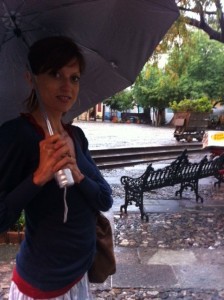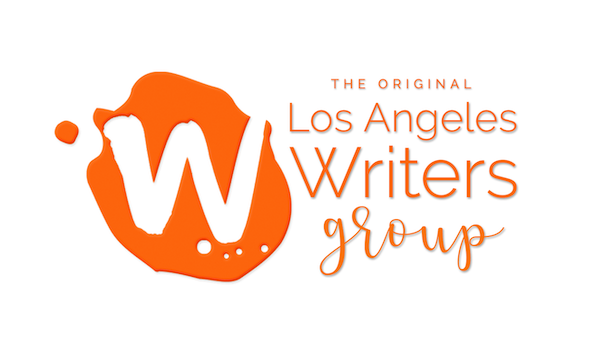We thought we’d dive a little deeper with our poetry workshop leader, Sarah Eggers, since she specializes in getting writers to dig deeper with her innovative poetry workshops that often incorporate art into the writing process.
 When did you know that poetry was the form for you? What are the gifts that poetry offers you as a writer, as opposed to other genres?
When did you know that poetry was the form for you? What are the gifts that poetry offers you as a writer, as opposed to other genres?
When I was in the third grade, there was a woman who, for a span of perhaps a few months, would visit the classroom once a week to teach us poetry. Although I imagine I knew the word “poetry” before then, I don’t think anyone had ever really brought my attention to it before, made it a “real” thing, and I had certainly never been encouraged to write it. I don’t recall the woman’s name, remember very hazily that she was short and had frizzy dark hair, yet I can say without a doubt that she sent my life down the path it has taken by awakening in me whatever it is that poetry awakens in us. One of the first things I remember her doing was getting out a big box of Crayolas and having each of us choose a color at random to “write a poem about.” Mine was periwinkle. I remember how the word itself, the sparkling taste of it in my mouth, and the color I was holding in my hand suddenly merged into a brilliant and sensuous whole, leaping up into my consciousness. Poetry somehow made words, and the things they represented, come to life inside me. I remember my periwinkle poem involved a sad princess leaning over a bottomless pool in a vain search for her periwinkle ring, or some such thing (hey, I was 8). But the poem, I recall, repeated the word periwinkle over and over, like an incantation. I think that incantatory quality is what makes poetry different from other genres. This is not my original thought–the poet Ed Hirsch has written a whole book about it–but it is my experience: poetry is something very close to magic. It brings the things of the world and their signifiers into as close proximity as they can ever get, and energy explodes out of that near-fusion.
Who are your favorite, go-to poets? Why?
The list is in constant flux. I love so many different poets for many different reasons, but I guess if you hold my feet to the fire, I can name some poets who stick with me through every season and time of day. Probably my ultimate superhero poet is Elizabeth Bishop. Her poems strike the perfect balance that I love in poetry between artifice and naturalism. People remark about how in reading Bishop, you can feel “the mind at work on the page.” I think that is true. There is a sense of a very awake mind at the center of the poems in a constant state of discovery. But she writes in form just as well as in free verse with such a sense of restraint. It’s remarkable to have wildness, discovery and restraint all at work at once. I am getting excited just thinking of it! Come to think of it, the qualities I admire in Bishop’s poems might be prevalent in all the poets I would include on the “go-to” list: Rilke, Auden, Montale, Plath. And also contemporary poets I am mad about like Ann Winters, Cornelius Eady, Ann Carson, Lucie Brock-Broido. I am already thinking of all the others I am leaving off this list right now…
Can you share a favorite stanza by a favorite poet here and briefly say why you love it/why it works so well for you?
Since I have been talking about Bishop, I’ll include a passage from one of my favorite poems, “Crusoe in England.” I think the poem needs to be read in its entirety, particularly for the last stanza to devastate as it does, but here is a stanza from the middle of the poem:
My island seemed to be
a sort of cloud-dump. All the hemisphere’s
left-over clouds arrived and hung
above the craters—their parched throats
were hot to touch.
Was that why it rained so much?
And why sometimes the whole place hissed?
The turtles lumbered by, high-domed,
hissing like teakettles.
(And I’d have given years, or taken a few,
for any sort of kettle, of course.)
The folds of lava, running out to sea,
would hiss. I’d turn. And then they’d prove
to be more turtles.
The beaches were all lava, variegated,
black, red, and white, and gray;
the marbled colors made a fine display.
And I had waterspouts. Oh,
half a dozen at a time, far out,
they’d come and go, advancing and retreating,
their heads in cloud, their feet in moving patches
of scuffed-up white.
Glass chimneys, flexible, attenuated,
sacerdotal beings of glass … I watched
the water spiral up in them like smoke.
Beautiful, yes, but not much company.
I love the conversational, intimate tone of the poem, the kind of gorgeous and almost mystical descriptions of the flora and fauna of the island, cheek by jowl with the most mundane observations: “Was that why it rained so much?” She is a master of description: it seems so deadly accurate, so unembellished, (“The beaches were all lava, variegated,/black, red, white and gray”) yet reaches heights of near ecstatic awe (“Glass chimneys, flexible, attenuated,/sacerdotal beings of glass…”) With Crusoe as our speaker, the island is brought to hissing, bubbling life for us, a chaotic parade of gurgling lava and turtles and low hanging, pulsing hot-to-the-touch clouds–bursting with life because they are seen through mind of the speaker gone half-crazy with isolation. You should all go read the rest of the poem now!
How do you normally sit down and get words on the page? What is that process for you? Where do your ideas come from, if there is a typical way you generate material?
I usually write out of obsession. That is, I tend to get some bit of story, or idea, or image stuck in my head that festers and festers until I sit down to explore it in a poem. I often say that poetry is where I do my best thinking. It seems to be the clearinghouse where things that have been stirring and brewing and getting all tangled up in my mind can go to get transformed into something coherent, expressible. I say it is where I do my BEST thinking, because it is a kind of thinking that uses all parts of me–mind, heart, senses. It usually takes me many, many hours of what seems like very bad thinking, by the way, to get there.
What is your revision process like?
I don’t have a formal revision process. Every poem is different. Sometimes, I revise as I am writing (not necessarily recommended) and the poem seems like a single draft (it is really a palimpsest, but the erasures are all in my mind). For other poems, I will tussle with them for a while to no avail, put them in the proverbial drawer, only to, months or years later, sit down to write a new poem and find it is actually a revision of the old “forgotten” one. I have been more rigorous about revision in the past, and I do counsel folks new to poetry to develop a revision process that leaves a little less up to chance. But I think one lesson that has been very important for me is to trust the poems more. If you listen to them, they let you know what they want and need. And sometimes what they want is to not be a poem at all.

You must be logged in to post a comment Login